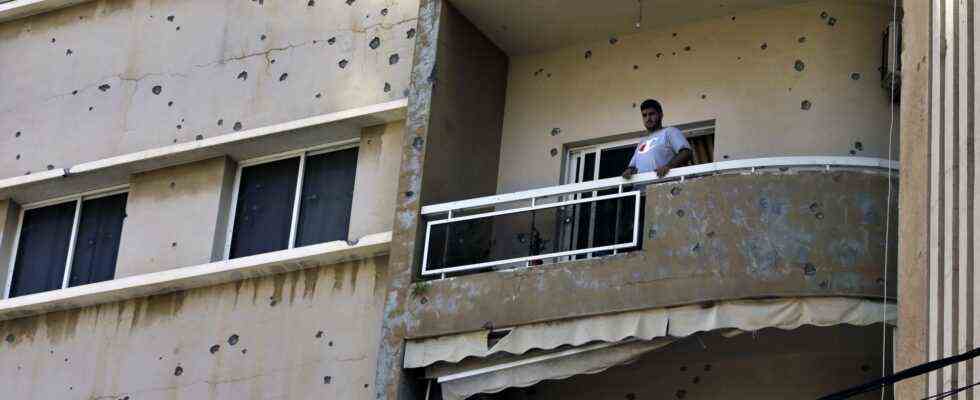Status: 10/16/2021 9:35 a.m.
After the firefights between Christians and Shiites, the situation in Lebanon is more hopeless than ever. The residents of Beirut are shocked, and many see their desire to leave the country confirmed.
It almost looks as if the residents of Beirut’s Maronite district of Ain al Remmaneh are realizing what happened to them in slow motion. The streets are still almost deserted, in many places littered with bullet shells and glass splinters, most of the shutters are closed and many doors are locked.
All major intersections are manned by heavily armored military. Only a few older people dare to take to the streets because someday someone has to clear away the dirt left by the several hours of firefight. “The bullets smashed through my shop window and into the back of the wall,” says grocer Eli Thanou. He ducked, crawled around on the floor, and hoped his wife wouldn’t be caught up on the third floor.
Protests against Christian investigative judges
A few hundred supporters of the Shiite Hezbollah and the Amal movement marched in front of the nearby Palace of Justice in protest against a controversial investigative judge. The judge – a Maronite Christian – is currently investigating the background to the devastating explosion in the port of Beirut, which devastated large parts of the city center in August 2020. In doing so, he seems to have come a little too close to some Hezbollah representatives.
Maybe that would be a little story, but in Beirut certain circles sometimes put a few bazookas in the trunk during political demonstrations.
Ain al Remmaneh is a Christian Maronite neighborhood with street names like Saida Lourdes – Street of the Blessed Virgin of Lourdes. From there, of all places, the fighters of the Christian militia Forces Libanaise set fire to the Shiite protest march. The fighting lasted four hours, snipers fired from high-rise buildings at anything that was moving, Hezbollah fired back with bazookas. When it was over, six dead and nearly 30 wounded were counted.
The state as prey
Eli Thanou, the grocer, knows it, he has seen it all before as a teenager during the civil war that began in 1975, lasted 15 years and cost 150,000 lives. When things started again in his neighborhood, Christians against Muslims, the old traumas were awakened. “This is Lebanon,” he says, “of course it can happen again, today, tomorrow, in a few months, here you never know what’s coming.”
His eldest son has already left the country and lives in Canada. The second son will soon be on his way to Europe. “Then the old folks will follow suit,” says Eli Thanou. “What else are we supposed to do here?”
Lebanon is degenerating into a hopeless case, and the chic bars and restaurants on Beirut’s Corniche, which still offer a small upper class some pastime, don’t hide this fact. The banking system has collapsed, the Lebanese pound has lost 90 percent of its value.
And the state, weakened and corrupt, has been the prey of different clans and denominations for decades. The office of president belongs to the Christians, the prime minister to the Sunnis, the Shiites provide the speaker of parliament. This is how it goes across government agencies. If interests overlap, everyone has their livelihood. If they get in each other’s way, danger is imminent for the Lebanese.
“The young people are just depressed”
“The only solution would be to break the sectarian structure of the system,” says Bassel Abdallah, one of the leading figures in civil society in Beirut. “We have been trying to punch holes in the system for 15 years now. But we cannot get through. It takes time. The protests of 2019 have at least shown that young Lebanese in particular want the transition to the secular.”
But where are the young men and women today who, two years ago, peacefully protested by the thousands against the corrupt regime? “You’re just depressed,” says Abdallah. “You can see that the country is at its end, bankrupt, that not even a revolution would change anything here.”
Violence as a symbol of mourning – a Hezbollah supporter fires shots into the air on the funeral march for the victims.
Image: AFP
But what still works very well are the traditional reflexes and rituals, the roar of battle slogans, the firing of the Kalshnikov, the celebration of unconditional sacrifice.
The Shiites carried their dead to their grave yesterday afternoon, four young men who lost their lives in the firefight in Ain al Remmaneh. “Schuhada”, martyr, is what the sheikh calls her, who is about to bury her. And assured, everyone wanted to be martyrs in order to partake of the joys of paradise.
Beirut licks its wounds
Martin Durm, currently Beirut, October 16, 2021 8:31 am

